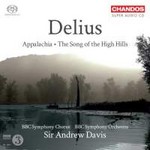
Delius: Appalachia / The Song of the High Hills
 $40.00
Out of Stock
$40.00
Out of Stock6+ weeks add to cart
FREDERICK DELIUS
Delius: Appalachia / The Song of the High Hills
BBC Symphony Chorus & BBC Symphony Orchestra, Sir Andrew Davis
[ Chandos / Hybrid SACD ]
Release Date: Friday 1 April 2011
This item is currently out of stock. It may take 6 or more weeks to obtain from when you place your order as this is a specialist product.
"This is a magnificent, clear-edged recording of two challenging, problematic works, performed here with vibrancy and confidence...Davis's diligent control of this extraordinary material makes for compelling listening."
(Gramophone Award Finalist 2011 - Choral)
"[Davis] guides the BBC Symphony Orchestra through two beautifully expressive performances that challenge accusations [that] Delius is boring...Credit must also go to the chorus, which tackles its integral role with great subtlety and skill, from the stirring final song of the first piece to the transcendent, wordless choral work of the second."
(Classic FM)
"Davis combines a sensitive feeling for tempo and shape with superfine detail of phrasing and balancing...The BBC Symphony Orchestra plays for its former chief conductor with precision and spirit, the solo voices make an excellent contribution, and the BBC Symphony Orchestra achieves miracles of quiet singing and climactic exultation."
(Five Stars BBC Music June 2011)
This recording presents two comparatively rarely heard but striking works by Frederick Delius, performed by the BBC Symphony Orchestra under Sir Andrew Davis with entirely idiomatic results. Both works are prime examples of Delius's highly individual and ground-breaking use of voices in predominantly orchestral works.
In Appalachia, the sombre mood reflects the fate that overcame many black slaves along the Mississippi River, who were sold by one cotton planter to another, simply uprooted from loved ones, and transported to a different place - the practice is the origin of the expression 'being sold down the river'. The inspiration for the work came to Delius when he was working on an orange plantation in Florida as a young man, and from across the water in the distance heard the singing of black farm labourers. Many year later, Delius recollected: 'they showed a truly wonderful sense of musicianship and harmonic resource in which they treated a melody, and hearing their singing in such romantic surroundings it was then and there that I first felt the urge to express myself in music.'
Setting an anonymous slave song, Delius expresses the human tragedy that unfolds in it initially through the full chorus in unaccompanied song. The orchestra steals in to reflect on the suffering before the baritone sings and the chorus responds. Rising to its climax, the music suggests hope and human dignity triumphing over adversity; the music of the introduction returns and the vision poignantly fades as the ship with its dispossessed slaves sails downstream and disappears from sight.
The inspiration for The Song of the High Hills was the mountains of Norway, which Delius regarded as his spiritual home. In 1911, he started composing the tone poem in which he sought to capture the impression created by a still summer night in the Norwegian mountains. It was completed the following year, written for large orchestra and chorus which, as in Appalachia, plays an integral part in the work, although the singers here are wordless. To emphasise their role in providing colour to the texture, they were directed to be seated throughout, and to 'sing on the vowel only which will produce the richest tone possible'.
In the words of Delius, the work 'expresses the joy and exhilaration one feels in the mountains and also the loneliness and melancholy of the high solitudes and the grandeur of the wide far distances. The human voices represent man in nature; an episode which becomes fainter and then disappears altogether'. Delius considered this not only one of his best works, but one of the works in which he had expressed himself most completely.
Tracks:
Appalachia (Variations on an old slave song)
(with Andrew Rupp, baritone)
A Song of the High Hills


